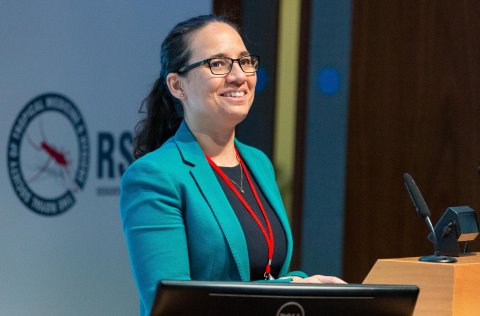Annual Meeting 2021 - Roundup

Earlier this month we were delighted to host our Annual Meeting on the topic of drug resistant infections.
One of our five strategic priority areas, this follows a tried and tested pattern of using the opportunity of our Annual Meetings to bring together expert speakers from their fields to share their experiences and knowledge as well as discuss their successes and challenges.
Following this approach in 2017 on the topic of Planetary Health, 2018 on NTDs and their externalities, 2019 on One Health, and 2020 on Emerging Diseases and Outbreaks – this year we were again able to put together a final panel at the end of the Annual Meeting to make a note of the big strategic themes and areas of focus. Within the panel discussion, chaired by Professor Chris Whitty, we also focused part of the discussion solely on what role RSTMH could have in this area of work, and what it should be focusing its time and attention on.
As in previous years, there were far more ideas than we would be able to deliver, therefore the next step will be to look at the list alongside our other priorities and decide what should be tackled first.
There were items that came up this year that we felt we could focus on immediately, and also things that will take us a little more time, as well as additional resource and energy. I have summarized the list below:
Areas we can tackle now
- Awareness and advocacy – we can engage with our national and global partners who work directly in the drug resistant infection and AMR space and ask them how we could showcase their work, case studies and best practice learnings and share amongst our networks
- Support through grants – around 52 of the 1,200 applications (4%) for our small grants had the term ‘AMR’ in the title. Though there are likely to be other applications which are focused on drug resistance, we can do more now to encourage those early in their careers to think about carrying out a project in this area of work. We could also particularly seek projects out in the areas that were encouraged by the panelists, which included needs assessments, studies around the impact of interventions, capacity building, and system strengthening
- Publication – we could look into the potential for a supplement or special issue on the topic of drug resistance in one of our two scientific journals. This could include the lesser discussed areas including antivirals and the role of traditional medicine
- Events and meetings – we could utilize our broad networks to bring together clinicians, researchers, policy makers and communicators to pick up themes that were discussed during the event
- Ambassadors – we could engage with our ambassador network and ask them to advise us on ways we could support any gaps in their national action plans
- Partnerships – we could identify new partners who we could work with in this area of work – either to support their work or to generate new activities
- Policy position – we can update our policy position on drug resistant infections to bring it up to date with the current international research priorities, ongoing debates and contemporary thinking
Areas we can explore in the future
- Raise awareness – consider creative and effective ways to raise awareness of the lesserknown areas of drug resistant infections so we can level up the awareness
- Scope the potential to provide a grant to a research network, rather than an individual, to focus on identified areas of research need
- Economic impact – at Lord Jim O’Neill’s talk on day one he talked about the benefit of quantifying the economic cost of not addressing antibiotic resistance. It would be interesting to explore the potential of this exercise to support other areas of resistance
- Evidence of impact – to model and measure more closely the impact of our work and interventions on the area of drug resistance
- Global movements – recognize the incredible national and global activities in this area such as the WHO Global Action Plan
- Mobilise our members we could engage directly with our members to understand their work in this area and how we can support them. We could also facilitate a member-wide consultation to develop a framework for local surveillance in partnership with WHO and other partners. This could help us to also suggest areas for potential research through our grants, which would be useful at local, national and international scales
- Convene and debate we could convene some debates on key themes of this area including identifying research and funding gaps
- Host resources – the society could bring together acceptable international standards of collaborative research and publications to help assist research in this area
As with all strategic priorities, we will now spend time considering how we take forward this extremely useful list of opportunities from our expert panel, speakers, and audience. This will include areas we focus on now for the remainder of our current strategy period, and also those which will need some additional focus and resource that may be included in our next strategy (due to start in 2023).
This is a crucial topic in helping to control disease and minimize serious illness and death, and one that may have lost some momentum during the coronavirus pandemic. We commit to doing all we can within the Society and with our networks and partnerships to try and tackle some of the big issues within drug resistance.
We look forward to working with our members, friends and partners on this, and would like to thank the speakers and attendees of our Annual Meeting 2021.